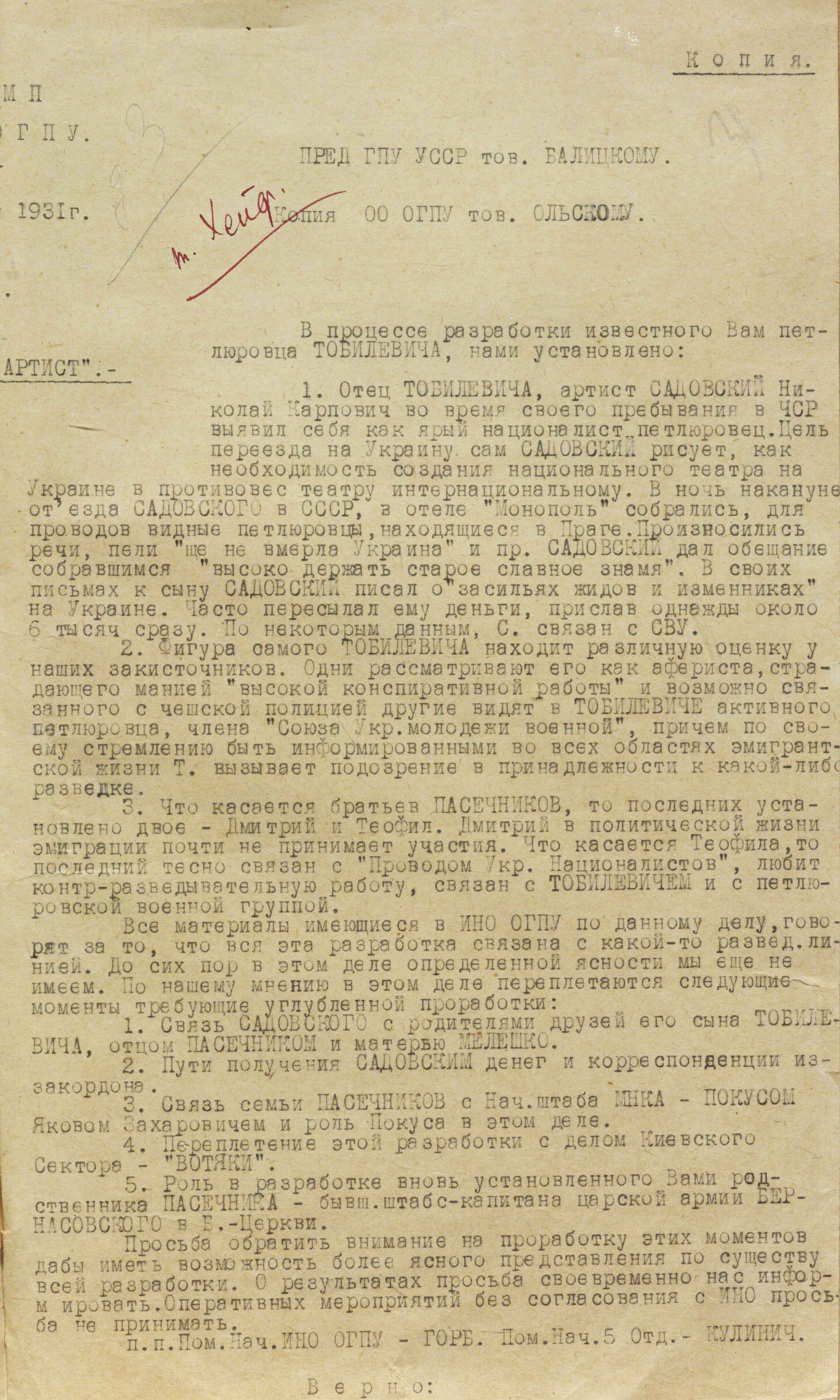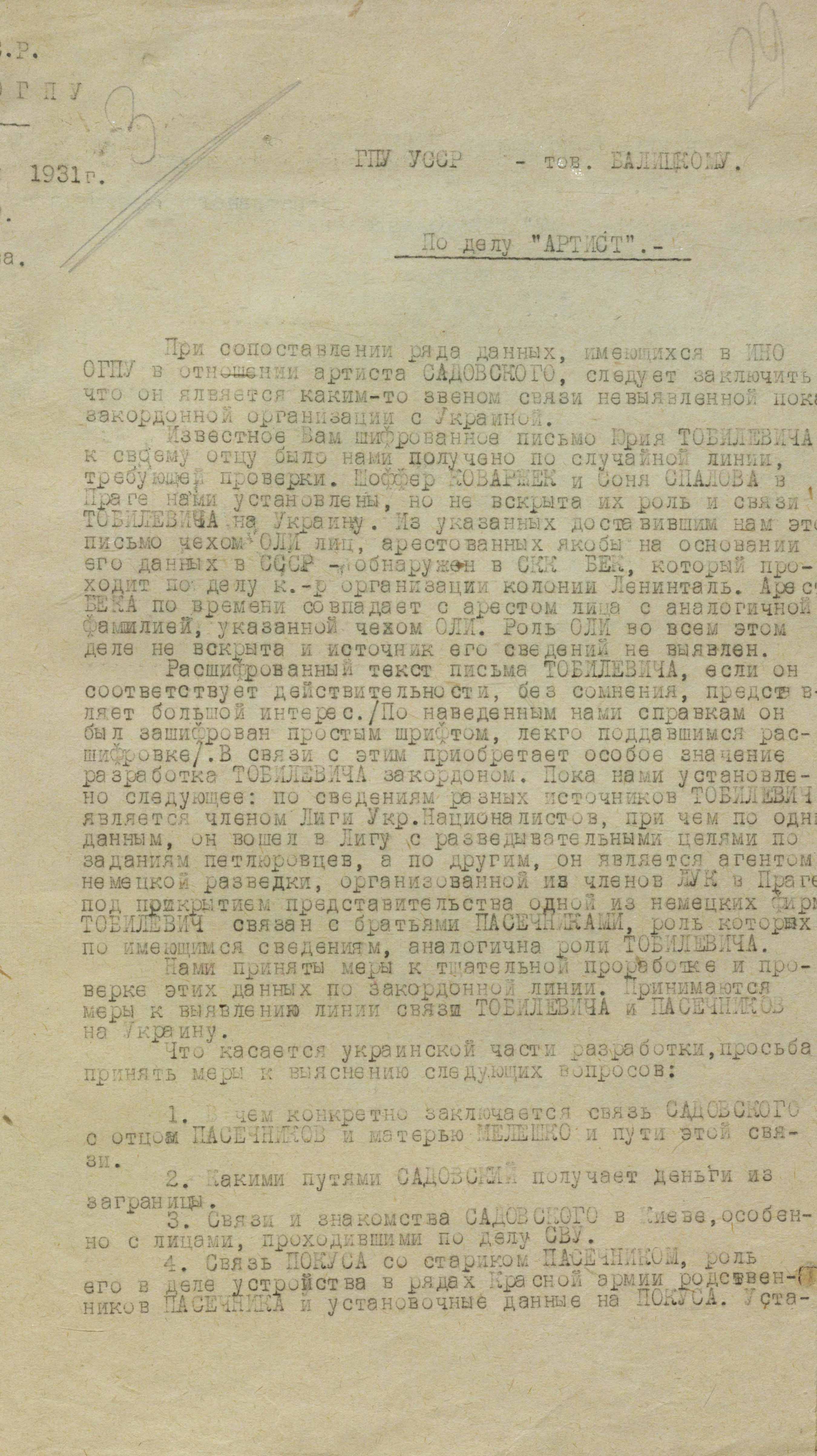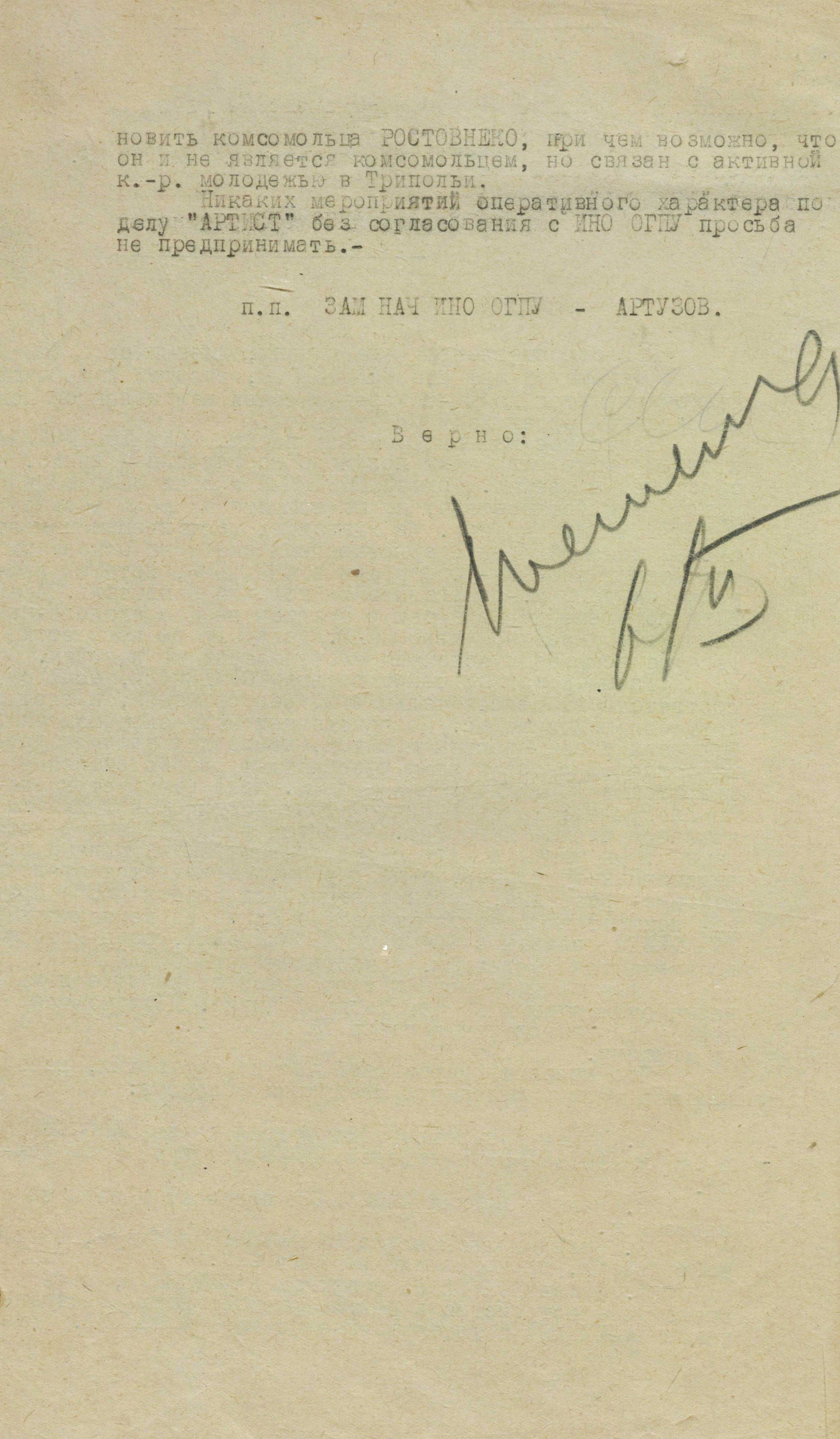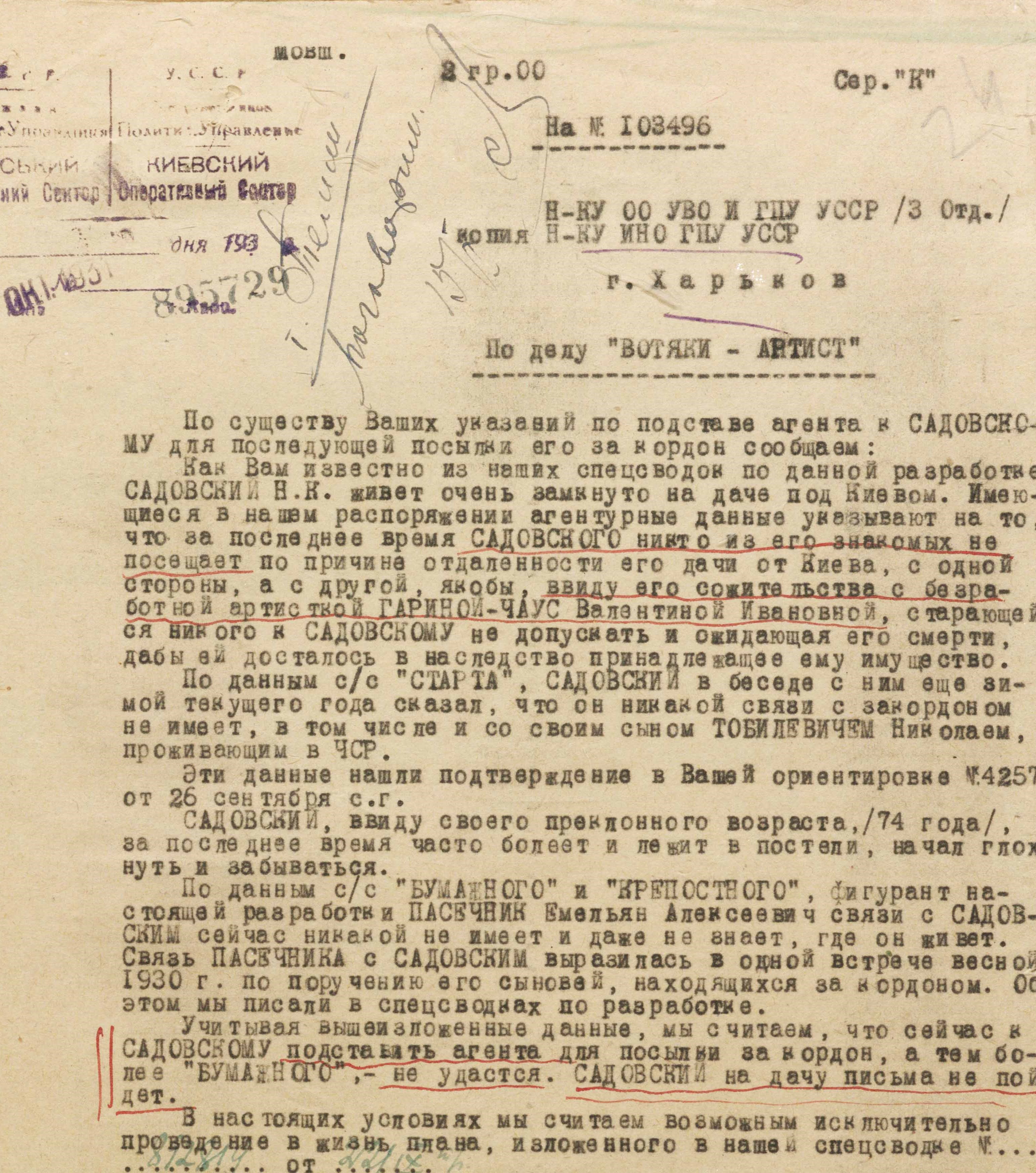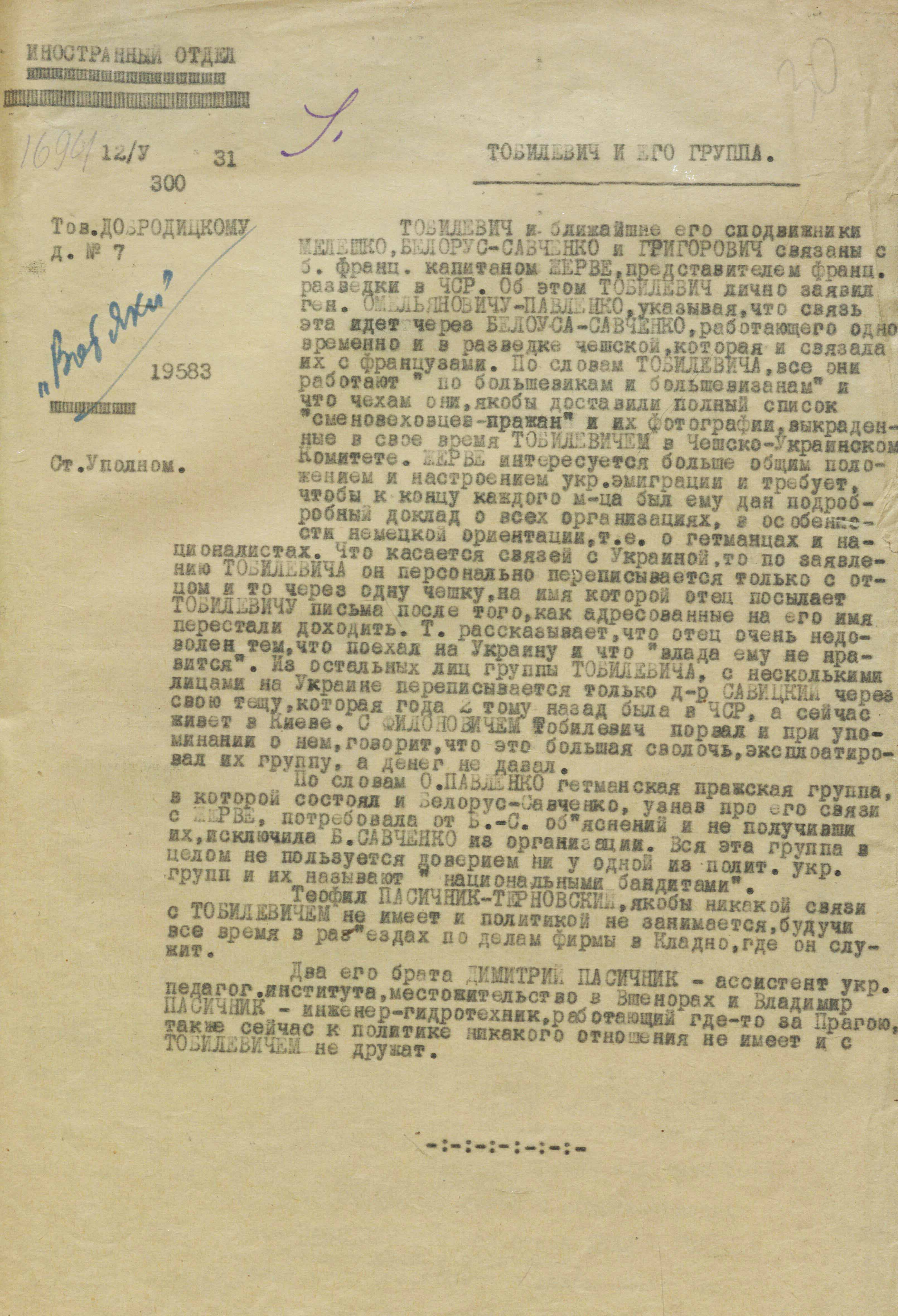Mykola Sadovskyi and Mykola Tobilevych. Encrypted Correspondence
2/7/2025
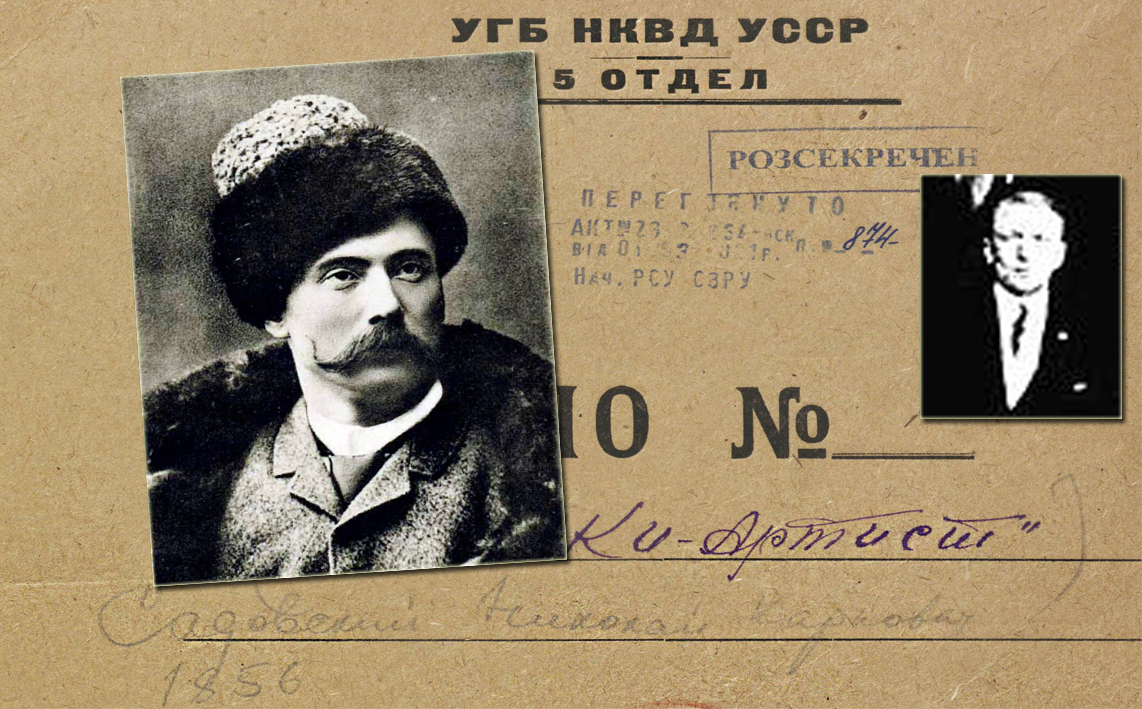
Some of the letters that Mykola Tobilevych sent from Prague to Kyiv to his father, Mykola Sadovskyi, were encrypted. But that was not a theater game and was not done for entertainment. The Lieutenant Colonel of the UPR Army had every reason to suspect that he and his father, a prominent theater figure who returned home from exile in 1926, might be being watched by the gpu. Declassified documents from the archives of the Foreign Intelligence Service of Ukraine tell us about those events, which are still unknown to the general public.
“gpu of the Ukrainian ssr.
Comrade Balytskyi
On the case of “Actor”
A comparison of a number of pieces of information available in the foreign department of the ogpu regarding the actor Sadovskyi, leads to the conclusion that he is a link between an undisclosed foreign organization and Ukraine.
The known to you Tobilevych’s letter to his father, was received by us through an accidental line that needs to be verified...
The decrypted text of Tobilevych's letter, if it is true, is undoubtedly of great interest. (According to the information we have obtained, it was encrypted with a simple cipher that was easily deciphered.) In this regard, cultivation of Tobilevych abroad is of particular importance...
At the same time, no operational measures should be taken in the case of “Actor” without the approval of the foreign department of the ogpu.
Deputy Chief of the Foreign Department of the ogpu Artuzov”
(FISU. – F.1. – Case 8918. – P.29).
This letter, which came to Kharkiv, the capital of the then Ukrainian ssr, from moscow, from the Foreign Department of the ogpu, is dated 1931. It was then that the case file “Actor” was opened on Mykola Karpovych Sadovskyi (real surname Tobilevych), a coryphaeus of Ukrainian theater, director, actor, writer, translator, and public figure.
According to archival documents, the case was initiated in moscow. The main operational cultivation was carried out from the positions of the residentura of the ogpu of the ussr in Prague. Therefore, the warning that no measures should be taken without moscow’s approval was not accidental. Artur Artuzov's signature on the document showed that the cultivation was of great importance. After all, Artuzov was already known at the time as the leader of the chekist operations “Trest” and “Sindicat”. Measures to infiltrate into Pavlo Skoropadskyi's inner circle abroad and many others were coordinated with him.
The case files were accumulated in the central office of the ogpu. Only individual instructions were sent to Kyiv, certain tasks were set, and permission was given to conduct some operations. Therefore, the available documents do not allow us to draw a complete picture. At the same time, even those found in the FISU archives bear witness: Mykola Sadovskyi, like many other Ukrainian cultural and artistic figures, was on the ogpu’s radar screen. Only his senior age, diseases, and some other circumstances saved him from repression.
In general, events developed in such a way that the colorful figure of Mykola Sadovskyi could not be ignored by the chekists. He was quite famous and popular in Ukrainian circles. Together with his siblings – Ivan Karpenko-Karyi, Panas Saksahanskyi, and Maria Sadovska-Barilotti – he created the history of the Ukrainian theater. Together with Maria Zankovetska, with whom he built a complicated family relationship, he organized the first stationary Ukrainian professional theater in Kyiv.
He joyfully welcomed the proclamation of the Ukrainian People's Republic. At that time, he worked as the chief commissioner for organizing folk theaters for the front and the rear on the territory of the UPR. His theatre and he played the role of the horsemen who met Symon Petliura in Sofiivska Square. He was the manager of the festive event during the announcement of the Act of Unification of Ukrainian Lands in Kyiv on January 22, 1919; he was responsible for the accommodation of delegations from other cities and from abroad that came to the capital. Later, he emigrated with the government and the UPR Army to Vinnytsia, Kamianets-Podilskyi, and abroad. In 1921, he headed the “Prosvita”’s theater in Uzhhorod. There he met his son, Mykola Mykolaiovych Tobilevych, who was a senior officer in the UPR Army at the time. Together they left for Czecho-Slovakia.
While abroad, Sadovskyi tried to create a theater company to stage Ukrainian plays and organize tours, but not everything worked out. His son Mykola plunged into political activity. During the years of the national liberation struggle for Ukraine's independence, he served as a junior starshyna of a cavalry division at the Main Department of the General Staff of the Ukrainian State. During the Directory, he commanded a hundred of the Lubny Cavalry Regiment and held other positions in the Army. Later he was in a camp for interned military servicemen of the Ukrainian Army in the Polish city of Kalish, participated in the UPR Army’s Second Winter Campaign, was promoted to Lieutenant Colonel, studied at the Faculty of Philosophy at Charles University in Prague, and gained a degree of Doctor of Philosophy. At the same time, M. Tobilevych became a co-founder and leader of the public and political organization “Legiia Ukrainskykh Natsionalistiv (League of Ukrainian Nationalists – Transl.) and later – a member of the OUN.
It was because of this political activity and his intention to continue the struggle for the restoration of Ukraine's independence that M. Tobilevych was noticed by the residentura of the ogpu of the ussr in Prague. The information sent to moscow showed that he was a rather dangerous person for the soviet authorities. In particular, he was “conducting intelligence work for Czechs, the French, and Poles”, who were acting against the bolsheviks. Besides, he “established contact with an English Major, a representative of the Intelligence Service, and allegedly joined the League of Ukrainian Nationalists “for intelligence purposes on the instructions of Petliurists” and was at the same time an agent of German intelligence. Such labels were the norm in chekists’ practice at the time.
Interest in M. Tobilevych intensified after it was reported from abroad that he had been in contact with Colonel-General of the UPR Army, Commander of the Troops in the First Winter Campaign Mykhailo Omelianovych-Pavlenko, former insurgent Otaman Fotii Meleshko, and members of the First Congress of Ukrainian Nationalists Teofil Pasichnyk-Tarnavskyi and Mykola Stsiborskyi, who were members of the League of Ukrainian Nationalists. In 1929, the latter two became the founders and first members of the newly created OUN. From the very first days, M. Tobilevych joined the Organization. The chekists could get his photo from a group photo of the leaders of the League.
The leadership of the ogpu began to solve this intricate puzzle.
According to archival documents, moscow would periodically send requests to Kharkiv and Kyiv to check certain individuals involved in the case and to collect information on them. In particular, they studied Teofil Pasichnyk-Tarnavsky's father, as well as Mykola Sadovskyi himself, who could not stay in exile for long and returned to his homeland. One of the papers addressed to the chief of the gpu of the Ukrainian ssr Vsevolod Balytskyi, stated:
“In the course of the cultivation of the well-known Petliurist Tobilevych, we have established as follows:
1. Tobilevich's father, the actor Mykola Sadovskyi, during his stay in Czechoslovakia proved to be an ardent nationalist-Petliurist. Sadovskyi himself explains the aim of his move to Ukraine as the need to create a national theater in Ukraine as opposed to an international theater. On the night before Sadovskyi's departure for the ussr, well-known Petliurists who were in Prague gathered at the Monopol Hotel to see him off. They made speeches, sang “Ukraine Has Not Died Yet”, etc. Sadovskyi promised the audience to “hold the old glorious flag high”.
(FISU – F.1. – Case 8918. – P. 31).
The document further suggested that M. Sadovskyi was associated with the Union for the Liberation of Ukraine. It also referred to the father-son correspondence.
The suspicion of involvement in the SVU, an invented by the chekists anti-soviet organization of Ukrainian scientific, cultural intellectuals and church leaders, could have had quite serious consequences for M. Sadovskyi. But the case did not go beyond groundless speculations. As for the correspondence, it was seized upon and put under control. The letters revealed his dissatisfaction with his decision to return to Ukraine and that he did not like the soviet power.
At some point, the letters from his son stopped coming, although Mykola Tobilevych did not stop writing. And then Sadovskyi probably suspected something and gave his father the address of his Czech acquaintance for correspondence. And then he also resorted to encrypting his messages. Eventually, one of such letters was intercepted by the chekists. All of this could have led to charges of espionage. The same ogpu paper pointed out: “All the materials available to the ogp's INO on this case indicate that this cultivation is connected with some kind of intelligence line.”
The Kyiv operational sector of the gpu was tasked to study M. Sadovskyi and his circle of acquaintances in more detail. At the same time, in June 1931, the foreign branch of the gpu of the Ukrainian ssr planned an operation to bring an agent to him. Later, the agent was supposed to be sent abroad, to Prague, to be infiltrated into M. Tobilevych's environment. Here is how it is described in the document:
“The rough plan of the setup is as follows: an agent aged 27-29 (had never been acquainted with Sadovskyi), who has connections among chauvinist student youth of Kyiv, spreads among a small group of young people the idea of the need for financial assistance to the “luminary” of the Ukrainian scene Sadovskyi, who is in need. Having “fundraised” the appropriate amount of money, 120-150 rubles, the agent visits Sadovskyi and gives him the money on behalf of a group of his “fans”.
Having got acquainted with Sadovskyi, the agent becomes friends with him. After a while, the agent is “expelled” from the university as a socially alien element. Being “dissatisfied with the soviet power” and intending to continue his education, he decides to go abroad to the Czech Republic. To this end, he asks Sadovskiy to give him letters of recommendation to his acquaintances in the Czech Republic.”
(FISU. – F.1. – Case 8918. – P. 4).
According to the plan, this acquaintance was to be his son, Mykola Tobilevych. But at that time, it was no longer possible to meet with M. Sadovskyi either in the theater or at home. The Kyiv operational sector of the gpu of the Ukrainian ssr reported on this matter:
“Sadovskyi lives a very secluded existence in a dacha near Kyiv. The agent information at our disposal shows that none of his acquaintances have been visiting Sadovskyi lately because of the remoteness of his dacha from Kyiv on the one hand, and, on the other hand, allegedly because he lives with an unemployed actress, Valentyna Ivanivna Harina-Chaus, who wants to keep Sadovskyi isolated from society and is looking forward to his death so that she can inherit all his property...
Due to his senior age (74), Sadovskyi has lately been ill, bed bound, and is getting deaf and forgetful…
In view of the above, we believe that it will not be possible to make Sadovskyi help the agent leave for abroad... Sadovskyi will not agree to write a letter.”
(FISU. – F.1. – Case 8918. – P.24).
After those events, Mykola Sadovskyi did not live long.
He passed away on February 7, 1933, and was buried at the Baikove cemetery. He was lucky that the repressive machine of stalin's punitive organs, which was only gaining momentum at the time, did not have the chance to throw him into its millstones, as happened to Les Kurbas, Hnat Khotkevych, and others.
No information has been found about his son's further operational cultivation. Apparently, this was continued from the position of the residentura of the ussr ogpu in Prague. It is known from open sources that Mykola Tobilevych, at the outbreak of the soviet-German war, as part of an OUN-M marching group, reached Kyiv, organized the work of the Kyiv City “Prosvita”, was engaged in awakening the self-awareness of Ukrainians, educating them, publishing leaflets, brochures, and working on Ukrainian studies. Due to repression by the German occupying authorities, the organization ceased to exist. Soon after, M. Tobilevych left Kyiv for the West. After the Second World War, he lived in Czechoslovakia, continued to work and publish in emigrant publications.
He passed away on December 18, 1963, in Prague. He was buried at the Olšany cemetery. His tombstone reads: “Niki Tobilevic`. Son of M. K. Sadovskyi”.
